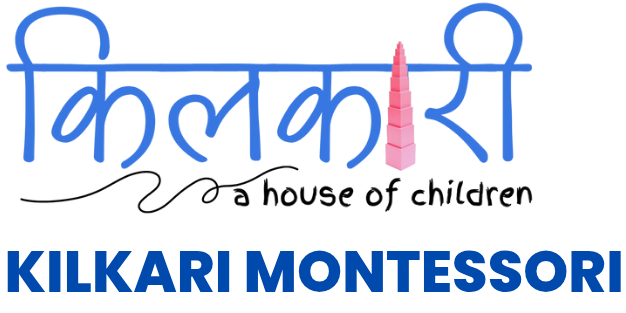15 months onwards up to 3 years
School timings -10 AM - 1 PM
Monday-Friday
Our toddler Montessori program have an atmosphere of loving support and respect where children of 18 months to 3 years learn to care for themselves and to interact with one another. Special attention is given to language and motor skill development.
Children absorb language around them very fast and
they must be given maximum opportunities to expand their vocabulary, listening
and conversation skills. Various activities such as naming, matching, sorting,
painting, singing, music, and both one on one and group interaction help in
enhancing their language and Communication.
Montessori Toddler Program offer a curriculum that
emerges from each child's unique skills and interests. Based on daily
observations, teachers introduce new materials and activities that pique
curiosity and stimulate learning. Learning objectives for your child at this
age include developing skills such as language, concentration, problem solving,
visual discrimination, and physical coordination. Activities promote
independence, order, coordination, and concentration, as well as support
social, emotional, physical, and cognitive development. These learning
activities include:
Throughout the primary curriculum the
children engage in hands-on learning using developmentally appropriate,
concrete, multi-sensory, self-correcting Montessori Material.
Our primary curriculum for children's of the age 3 to
6 years focuses mainly on five areas:
EPL (Exercises of Practical Life),
Sensorial,
Language,
Mathematics,
Geography.
Exercises of practical life: Building life skills-Independence, concentration and responsibility
In the Montessori classroom, young children are
normally drawn first to the Practical Life area because these materials
are most familiar to them. The Exercises of Practical Life have objects
and materials normally encountered in everyday living experiences such as
cleaning, sweeping, pouring, dressing, plant and animal care. The Exercises
of Practical Life fall into four major categories:
Care of the Self
Care of the Environment
Grace and Courtesy
Control of Movement.
Many are fundamental exercises that the child
needs to master to be able to live
comfortably in the real world.
Practical Life activities help the child develop
coordination, concentration, a sense of personal independence, and a sense of
order. Through the exercises of Practical Life, the child develops the
self-confidence and attention essential for mastery of the other more advanced
areas of the Montessori classroom.
Sensorial: Exploration of senses through scientifically designed materials
The Sensorial area consists of materials that educate and refine the child's senses. The child learns to recognize similarities and differences, to discriminate between similar objects; to grade similar objects. Qualities discriminated with the Visual sense are size, shape, and color; with the Tactile sense are texture, temperature, and pressure; with the auditory sense are intensity and pitch. Basic sensations of sweet, sour, bitter, and salty are discriminated with the Gustatory sense; various odors/fragrances are used to discriminate the olfactory sense. A primary purpose of the Sensorial Exercises is that "the child train himself to observe, that he be led to make comparisons between objects, to form judgements, to reason and to decide.
Language: Development of Early-Literacy skills through the use of phonetic sounds.
The foundation of our language program is Phonetics. Speech is made up of various sounds. Our Language program focuses on building on this knowledge of the child. Hence we begin with phonetics which brings the child’s attention to the different sounds that each word is made up of and then introduce alphabets that correspond to those sounds and after he has understood the method of co-relating sounds with their symbols which gives him a boost in Reading and Writing he is then given the names of the symbols (alphabets).
Mathematics: Development of Numerical skills.
Montessori believed that a child's mind is mathematical and
based on the order of perceptual awareness found in the development of the
senses. The acquisition of mathematical principles is seen as developing
logically from concrete to abstract, and from simple to complex.
It start from 1-10 and involves associating
number names, quantities and symbols. This area of learning follows a definite
pattern based on which concrete materials are offered. The child conceives all
the abstractions of operations of addition, subtraction, multiplication and division.
Culture: Awareness of the world around us
The Montessori cultural area includes variety of
subjects - geography, botany, zoology, science, art, and music.
By studying these subjects will provide children pan opportunity to explore
their curiosity of different and worldly ideas.
Geography: Children learn about the world through tactile
feelings of the Globe through puzzles and picture cards. The landforms like Lakes, Islands,
Bays and Capes are hands on learning and the children can see
visually the water bodies. The continents are colour coded so that the child
can associate the Continents easily. This way the child can work through
the activities with joy and interests.
Zoology: Children in the Montessori classroom learn about
insects and animals through puzzles, objects and pictures.
They learn about Vertebrates and Invertebrates through
nomenclature cards which helps to child to know the parts of the animals. They
are also introduced to Life Cycle of animals through stories and songs.
This way the child connects with nature and understand that animals too live in
Earth.
Botany: In the Montessori classroom child learn about different kinds of leaves
with the Botany Cabinet and match it with the cards. They also learn the
parts of the plants through puzzles and rhymes. Through the hands on learning
the children experience visually about the plants and names of different
flowers along with the colours. Nomenclature cards helps to identify the
parts of the plants and this way Botany becomes a lesson with utmost joy
and curiosity to learn about the plants and is also encouraged through art and
music.
2 Years Onwards -
Timings: 1:00 PM – 3:45 PM
(Monday -Friday)
Working parents need not worry about making separate arrangements once Montessori hours are done for their children. However, we keep the numbers limited, so each child gets adequate attention.
We will provide the following facilities:
09:00 AM to 4:00 PM
Monday to Saturday
